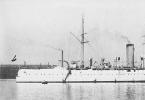Answers to school textbooks
"Moskvitian"
2. Who wrote the article “The Dark Kingdom”?
H.A. Dobrolyubov
3. Who are the prominent representatives of the “dark kingdom” in the play “The Thunderstorm”?
Wild, Kabanikha
4. Whom H.A. Dobrolyubov called it “a ray of light in a dark kingdom”?
Katerina
5. Establish a correspondence between the characteristics and their heroes.
CHARACTERS
1) Wild
2) Kabanikha
3) Feklusha
CHARACTERISTIC
A) “Who... will please, if... your whole life is based on swearing? And most of all because of the money; not a single calculation is complete without swearing... And the trouble is, if in the morning... someone gets angry! He picks on everyone all day long.”
B) “Prudence, sir! He gives money to the poor, but eats up his family [he eats] completely*.
Answer:
1 - A, 2 - B
6. Which of the play’s heroines has words that clearly characterize her?
“I say: why don’t people fly like birds? You know, sometimes I feel like I'm a bird. When you stand on a mountain, you feel the urge to fly. That’s how I would run up, raise my hands and fly.”
Katerina
7. A. N. Ostrovsky worked closely with the theater, on the stage of which almost all of the playwright’s plays were performed. What is the name of this theater?
Maly Theater.
8. Where does the play “The Thunderstorm” take place?
in Kalinov
9. Below is a statement from one of the heroes of A. Ostrovsky’s drama “The Thunderstorm”. Who owns these words? “Cruel morals, sir, in our city, cruel!
In philistinism, sir, you will see nothing but rudeness and stark poverty. And we, sir, will never escape this crust.”
Kuligin.
10. What, according to the crazy lady, threatens death?
free morals and treatment
11. Which of the heroes of Ostrovsky’s drama “Dowry” does Larisa Ogudalova thank for the “good deed” in the finale of the play?
Karandysheva
12. To what literary genre can the play “The Thunderstorm” be classified (as defined by the author)?
13. Name the main conflict in the play “The Thunderstorm”.
clash between tyrants and their victims
14. A. N. Ostrovsky reveals the social-typical and individual properties of the characters of a certain social environment, which one?
merchant
15. Match the speech with the characters in the play.
SPEECH CHARACTERISTICS
A) “Was I like that! I lived, did not grieve for anything, like a bird in a field! *, “The winds are violent, you bear with him the sadness and melancholy.”
B) “Bla-alepie, dear, blah-alepie!.. You all live in the promised land! The merchants are all pious people, adorned with many virtues*.
B) “I haven’t heard, my friend, I haven’t heard, I don’t want to lie. If only I had heard, I would not have spoken to you like that, my dear.”
CHARACTERS
1) Kabanikha
2) Feklusha
3) Katerina
4) Wild
Answer:
A - 3, B - 2, C - 3
16. Establish a correspondence between the characters and the features of their vocabulary.
VOCABULARY FEATURES
A) church vocabulary, rich in archaisms and vernacular B) folk-poetic, colloquial, emotional vocabulary
B) petty-bourgeois-merchant vernacular, rudeness
CHARACTERS
1) Katerina
2) Kabanikha
3) Kuligin
4) Wild
Answer:
A - 4, B - 1, C - 2
A. N. OSTROVSKY. "STORM"
1. What city was A.N. born in? Ostrovsky?
a) Moscow b) St. Petersburg c) Kostroma d) Orel
2. What was the name of the first work that brought A.N. Is Ostrovsky famous?
a) “Picture of Family Happiness”
b) “Bankrupt (“Our people – we will be numbered”)
c) “Thunderstorm” d) “Don’t sit in your own sleigh”
3. What social class does A.N. Ostrovsky portray in most of his plays?
a) nobility b) peasantry c) merchants d) philistinism
4. In what year was the play “The Thunderstorm” created?
a) in 1859 b) in 1860 c) in 1861 d) in 1865
5. Name the type of literary hero who became the discovery of A.N. Ostrovsky.
a) the “superfluous person” type b) the “small person” type c) the tyrant type d) the tramp type
6. The city in which the action of “The Thunderstorm” took place was called
a) Kalinin b) Kalinov c) Kostroma d) Samara
7. Determine the genre of the work.
A)dramab)tragedyV)comedy d) novel
8. Determine the type of conflict in the drama “The Thunderstorm”.
A)philosophicalb)socialV)ideological d) family
9. Correct arrange the elements drama compositions "Storm".
A)exposition 1) conversation between Boris and Kudryash
b)plot 2) death of Katerina
V)climax 3) Katerina’s monologue before death
G)denouement 4) conversation between Kuligin and Kudryash
10. How artistic means transmitted V play motive isolation cities?
A)symbolic details - gate, fence
b)specific author's instructions, remarks
V)lack of communication with other cities d) image of Feklushi
11. For what purpose does A. N. Ostrovsky introduce exposition into the play?
a) to emphasize the positive traits in Kuligin’s character
b)outline the conflict between youth and the older generation in the play
V)indicate the location and situation in the city
d) give national scale and poetic inspiration
12. The system of images in the play “The Thunderstorm” is built on the principle of “pairing”. Identify these pairs among the given characters (the same name can be used more than once)
Katerina; Wild; Curly; Kabanikha; Boris; Varvara.
13. List the names of the characters in the play, who, from the point of view of classical drama, can be called “extra characters.”
a) Varvara b) Kudryash c) Kuligin d) Feklusha
e) half-crazy lady f) Shapkin g) Glasha
14. IN the confrontation of which heroes is most vivid expressed himself the main conflict of the play?
a) Kabanikha - Wildb)Katerina - VarvaraV)Katerina - Kabanikha d) Katerina - Tikhon
15. How the “dark kingdom” is represented at the character level And his "victims"? Select both from the list.
Wild; Katerina; Tikhon; Feklusha; Boris; Kabanikha; Varvara; half-crazy lady; Curly.
16. Which of the characters in the play speaks this way about Kabanikha?
“- Hypocrisy, sir! She gives money to the poor, but she completely eats up her family...”
A)Borisb)KuliginV)Katerina d) Dikoy
17. At what point does the main climax of the play occur?
A)Katerina's public confession of her sinfulnessb)date with Boris
V)in Katerina’s monologue at the end of the play d) there is no climax in the play
18. Why was A. N. Ostrovsky called “the father of the Russian national theater”?
a) revived the traditions of A.S. Griboyedov, A. S. Pushkin, N. V. Gogol
b)he penned forty-seven plays,
V)with his creativity had a decisive influence on the subsequent development of progressive Russian drama
d) built the Maly Theater building
19. Whom did N.A. name? Dobrolyubov “a ray of light in the dark kingdom.” This is:
a) Kuligin b) Katerina c) Boris d) Marfa Ignatievna
Answers to the test " A. N. OSTROVSKY. "STORM"
7. a
8. g
9. a - 4, b - 1, c - 3, d - 2
10. g
11. g
12 Katerina - Kabanikha; Kabanikha - Wild; Katerina - Boris; Varvara - Curly; Katerina - Varvara
13. d, f, g
14. in
15. "dark kingdom": Dikoy, Kabanikha, Feklusha, the half-crazy lady;
"victims": Katerina, Tikhon, Boris, Varvara, Kudryash
16. b
17. in
18. in
19.b
Read the text fragment below and complete tasks B1-B7; C1-C2.
B o r i s. Eh, Kuligin, it’s painfully difficult for me here without the habit! Everyone looks at me somehow wildly, as if I’m superfluous here, as if I’m disturbing them. I don't know the customs here. I understand that all this is Russian, native, but I still can’t get used to it.
K u l i g i n. And you will never get used to it, sir.
B o r i s. From what?
K u l i g i n. Cruel morals, sir, in our city, cruel! In philistinism, sir, you will see nothing but rudeness and stark poverty. And we, sir, will never escape this crust! Because honest work will never earn us more than our daily bread. And whoever has money, sir, tries to enslave the poor so that he can make even more money from his free labors. Do you know what your uncle, Savel Prokofich, answered to the mayor? The peasants came to the mayor to complain that he would not disrespect any of them. The mayor began to tell him: “Listen,” he says, Savel Prokofich, pay the men well! Every day they come to me with complaints!” Your uncle patted the mayor on the shoulder and said: “Is it worth it, your honor, for us to talk about such trifles! I have a lot of people every year; You understand: I won’t pay them less than a penny per person, but I make thousands out of this, so that’s good for me!” That's it, sir! And among themselves, sir, how they live! They undermine each other's trade, and not so much out of self-interest as out of envy. They are at enmity with each other; They get drunken clerks into their high mansions, such, sir, clerks that there is no human appearance on him, his human appearance is hysterical. And they, for small acts of kindness, scribble malicious slander against their neighbors on stamped sheets. And for them, sir, a trial and a case will begin, and there will be no end to the torment. They sue and sue here, but they go to the province, and there they are waiting for them and splashing their hands with joy. Soon the fairy tale is told, but not soon the deed is done; they drive them, they drive them, they drag them, they drag them; and they are also happy about this dragging, that’s all they need. “I’ll spend it, he says, and it won’t cost him a penny.” I wanted to depict all this in poetry...
B o r i s. Can you write poetry?
K u l i g i n. In the old-fashioned way, sir. I read a lot of Lomonosov, Derzhavin... Lomonosov was a sage, an explorer of nature... But he was also from ours, from a simple rank.
B o r i s. You would have written it. It would be interesting.
K u l i g i n. How is it possible, sir! They will eat you, swallow you alive. I already get enough, sir, for my chatter; I can’t, I like to spoil the conversation! I also wanted to tell you about family life, sir; yes some other time. And there is also something to listen to.
Feklusha and another woman enter.
F e k l u sha. Blah-alepie, honey, blah-alepie! Wonderful beauty! What can I say! You live in the promised land! And the merchants are all pious people, adorned with many virtues! Generosity and many donations! I’m so pleased, so, mother, completely satisfied! For our failure to leave them even more bounties, and especially to the Kabanovs’ house.
They leave.
Tests
B1. Indicate the literary genre to which this work belongs.
B2. Determine the genre of the play “The Thunderstorm”.
VZ. What literary movement are the names of Russian poets M.V. associated with? Lomonosov and G.R. Derzhavin mentioned in Kuligin’s speech?
B4. Write a term that denotes words and forms of colloquial speech that give Feklushi’s speech a rude, stylistically reduced tone: “bla-alepie”, “up to the neck”, “our non-abandonment”, etc.
B5 What is the name of the means of artistic representation with which Kuligin characterizes the city of Kalinov: “cruel morals”, “naked poverty”, “malicious slander”?
B6 What is the name of the extended statement of one of the characters in the play?
Feklusha and another woman enter
Part C
C1. For what purpose does A.N. Does Ostrovsky include in the text of the play “The Thunderstorm” Kuligin’s story about the city of Kalinov and its inhabitants?
C2. In the works of which Russian writers (poets, playwrights) does the theme of the city arise and in what ways are these works consonant with Ostrovsky’s play “The Thunderstorm”?
Test work based on N.A. Ostrovsky’s play “The Thunderstorm”
Option 2
Part 1
1. Which statement about the thunderstorm belongs to Katerina? 1) “It’s not what’s scary that will kill you, but what’s scary is that death suddenly finds you as you are...”; 2) “For two weeks there will be no thunderstorm over me, there are no shackles on my legs”; 3) “A thunderstorm is being sent to us as punishment”; 4) “Now every grass, every flower is rejoicing, but we are hiding, afraid, as if some misfortune is coming!”
2. Not only does Katerina not belong to the Kalinovsky world by birth and upbringing, she is not her own, “alien” here and: 1) Kudryash; 2) Kuligin; 3) Boris 4) Shapkin
3. The play tells about Moscow with its wonders: 1) Boris 2) crazy lady 3) Kuligin 4) Feklusha
4. Find out, among the characteristics given to the heroes of “The Thunderstorm” by Dobrolyubov, the portrait of Boris: 1) “... he just wants more, as many rights as possible for himself, when should he recognize them for others... considers this an attack on his personal dignity, and gets angry, and tries in every possible way to delay the matter and prevent it.” 2) “... when he understands what... is necessary, and wants to achieve something, he will achieve his goal at all costs...” ;3) “...represents one of the many pitiful types who are usually called harmless, although they are just as harmful as tyrants, because they serve as their faithful assistants”;4) “Education took away from him the strength to do dirty tricks - but it did not give him the strength to resist dirty tricks,
5. Who is Kuligin talking about: “Prude, sir, he gives money to beggars, but he completely eats up his family”
a) about Feklusha b) about Glasha c) about Kabanikha d) about Katerina
6. Which character in Ostrovsky’s drama “The Thunderstorm” says: “Hard times... Time has already begun to decline”
a) Kuligin b) Dikoy c) Kabanikha d) Feklusha
7. About which hero of Ostrovsky’s drama “The Thunderstorm” do they say the following:
Who will please him when his whole life is based on swearing? And most of all because of money, not a single calculation is complete without swearing. Another is happy to give up his own, if only he would calm down. The trouble is, someone will make him angry in the morning.”
a) about Tikhon b) about Kuligin c) about Dikiy d) about Boris
8 “It’s not so scary that it will kill you, but that death will suddenly find you as you are, with all your sins, with all your evil thoughts.” Who do these words belong to? What and who is he/she afraid of?
1) Katerina. Thunderstorms and God
2) Varvara. Mother's anger
3) Wild. Lightning rod and god
4) Kuligin. Perpetuum Mobile and Wild
5) Feklushe. Human rumor and God
9.. Who helped Katerina secretly meet with Boris?
1) Kuligin 4) Varvara
2) Shapkin 5) Kudryash
3) Glasha 6) Tikhon
10. Katerina, unable to withstand the mental anguish, confessed to adultery and
1) went to a monastery 4) rushed into the Volga
2) drank poison 4) went crazy
Part 2
11. Identify the hero of the play using quotes:
1 “Every morning my aunt begs everyone with tears: “Fathers, don’t make me angry! Darlings, don’t make me angry!”;
2“..mother’s relatives didn’t let me in, they wrote that she was sick. What life at the ball would be like for her, it’s scary to imagine”;
3 “I’m completely ready, and the horses are ready. He's so sad, it's a disaster! I can see that he wants to say goodbye."
12. Determine which character the words belong to:
1 “I say, why don’t people fly like birds? You know, sometimes I feel like I'm a bird. When you stand on a mountain, you feel the urge to fly. That’s how I would run, raise my hands and fly”;
2 “And I, dear girl, am not absurd, I have no such sin. I have one sin, for sure; I myself know that there is. I love to eat sweets”;
3“They are at enmity with each other; They get drunken clerks into their high mansions, such, sir, clerks that there is no human appearance on him, his human appearance is hysterical. And they, for small acts of kindness, scribble malicious slander against their neighbors on stamped sheets.”
13.Who does N.A. Dobrolyubov call the “dark kingdom” in his article and why?
1st option
1. Match the definitions (see Table 1) and literary concepts: drama, tragedy, comedy, vaudeville
Table 1
2. Choose a definition of the concept “remark”.
A) Part of the act in which the composition of the characters does not change or a new character appears.
B) Text containing the words of one of the characters.
C) Introducing the characters, which tells about their age, social status, etc.
D) Most of the dramatic work.
A) Katerina’s suicide.
B) Tikhon returns from Moscow.
C) Katerina’s conversation with Varvara about childhood.
D) Boris leaves the city.
4. Who is saying this?
A) “Cruel morals, sir, in our city, cruel! In philistinism, sir, you will see nothing but rudeness and stark poverty. And we, sir, will never get out of this bark.”
B) “What does youth mean! It's funny even to look at them! If they weren’t their own, I’d laugh to my heart’s content: they don’t know anything, there’s no order. They don’t know how to say goodbye.”
C) “I am considered a rude person... he is a word, and I am ten; he will spit and go. No, I won’t slave to him.”
A) “One word: warrior!”
B) “And in the wild he seems to be tied up.”
D) “And I was not a liar, but I learned when it became necessary.”
6. Which of the characters pronounces these poetic lines? Which poet do they belong to?
My body is crumbling into dust,
I command thunder with my mind.
2nd option
1. Choose a definition of the concept of “drama”.
A) A dramatic work, the plot of which is based on an insoluble life conflict, ending in most cases with the death of the heroes.
B) A dramatic work that exposes, through ridicule, the vices of people and the negative phenomena of social reality.
B) A short comic play, usually with singing.
D) A dramatic work in which mainly the private lives of people are reproduced. It depicts the intense struggle of the heroes and an acute, predominantly social conflict.
2. Match the terms and their interpretation(see Table 2).
table 2
3. Restore the sequence of events.
A) Varvara’s flight from home;
B) Tikhon goes to Moscow on business;
B) Meetings between Katerina and Boris;
D) Getting to know the residents of the city of Kalinov and describing their morals.
4. Who is saying this?
A) “...What are you going to tell me to do with myself when my heart is like this! After all, I already know that I have to give, but I can’t give everything good. You are my friend, and I must give it to you, but if you come and ask me, I will scold you. I’ll give it, I’ll give it, but I’ll curse you.”
B) “Why don’t people fly!”
C) “Just think: no matter what I am, I’m still a man; Living like this all your life, as you see, will run away from your wife. But how do I know that there won’t be any thunderstorms over me for two weeks, there are no shackles on my legs, so what do I care about my wife?”
5. Determine from the remarks who they are talking about.
A) “Prudence, sir! He gives money to the poor, but completely eats up his family.”
B) “What an angelic smile she has on her face, and her face seems to glow.”
C) “Just now we attacked him with my uncle, we scolded him, scolded him - he was silent. Looks like he's become wild. With me, she says, do whatever you want, just don’t torture her!”
6. Which of the characters pronounces these poetic lines? Which poet do they belong to?
An abyss full of stars has opened,
The stars have no number, the abyss has no bottom.
KEYS
1st option
- A - tragedy
- B - comedy,
- B - vaudeville,
- G - drama.




